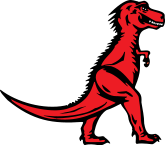
Mozilla was the official, public, original name of Mozilla Application Suite by the Mozilla Foundation, currently known as SeaMonkey suite.
Informally, the name has been used in a number of ways and in combination with other phrases, though all of them have been related to the now-defunct Netscape Communications Corporation and its related application software.
Only three things have ever formally used the term "Mozilla" alone:
- the codename for the Netscape Navigator software project
- the official name of what was re-named Mozilla Application Suite
- the Mascot of Netscape.
The various other related uses of the term "Mozilla" are listed below in the order when they were first used.
Codename of Netscape Navigator
Historically, Mozilla had been used internally as a codename for the Netscape Navigator web browser from its beginning. Jamie Zawinski came up with the name during a meeting while working at the company.[1] It was a reference to the name of the classic fictional monster Godzilla.
Mascot of Netscape

Mozilla was the mascot of the now-disbanded Netscape Communications Corporation, formerly called Mosaic Communications Corporation. Initially, the mascot took various forms, including that of a helmeted astronaut or "spaceman", but the eventual choice was a Godzilla-like lizard thought to go well with the Godzilla-like name. It was designed by Dave Titus in 1994.

Mozilla was featured prominently on Netscape's website in the company's early years. However, the need to project a more "professional" image (especially towards corporate clients) led to it being removed. Mozilla continued to be used inside Netscape, though, often featuring on T-shirts given to staff or on artwork adorning the walls of the Netscape campus in Mountain View.
When Netscape acquired the website directory NewHoo in 1998, they rebranded it the Open Directory Project with the nickname "dmoz" (Directory of Mozilla) due to its similarity to the Mozilla project. An image of Mozilla was placed on every page of the site, which remains the case today, despite Netscape's disbanding after its acquisition by AOL.
Part of the "user agent string" of many browsers
When users visit a website (via a user agent such as a web browser), a text string is generally sent to identify the user agent to the web server. It is known as the "user agent string". The Netscape web browser identified itself as "Mozilla/
Because the Netscape browser initially implemented many features not available in other browsers and quickly came to dominate the market, a number of web sites were designed to work, or work fully, only when they detected an appropriate version of Mozilla in the user agent string. Thus, competing browsers began to emulate ("cloak" or "spoof") this string in order to also work with those sites. The earliest example of this is Internet Explorer's use of a user agent string beginning "Mozilla/
Mozilla Foundation

"Mozilla" is sometimes used to refer to the free software/open source project that was founded in order to create the next-generation Internet suite for Netscape. The Mozilla Organization was founded in 1998 to create the new suite. On July 15, 2003, the organization was formally registered as a non-profit organization, and became Mozilla Foundation. The foundation now creates and maintains the Mozilla Firefox browser and Mozilla Thunderbird email application, among other software. The Mozilla trademark is held by the Mozilla Foundation as of 2006

Netscape announced on January 22, 1998 that it would be relicensing its source code for future development.[2] In March 1998, Netscape released most of the code for its popular Netscape Communicator Internet suite under a free software/open source license, the Netscape Public License. The application developed from this was named Mozilla, as this was the codename of the original Netscape Navigator. After a series of lengthy pre-1.0 cycles, Mozilla 1.0 was released on June 5, 2002.
The suite was well known as the free/open source base of the Netscape suite (versions 6 and 7), and its underlying code (most notably the Gecko layout engine) became the base of many standalone applications, including the Mozilla Foundation's flagship products Firefox and Thunderbird. To distinguish the suite from the standalone products, the suite is often marketed as "Mozilla Application Suite", or the more concise "Mozilla Suite".
The Mozilla Foundation no longer maintains the suite, so that their developers can focus on Firefox and Thunderbird. The suite has been handed over to the SeaMonkey Council which has continued development with SeaMonkey, an Internet suite developed by the Mozilla community that is based on the source code of the Mozilla Suite, and supersedes it.
No comments:
Post a Comment